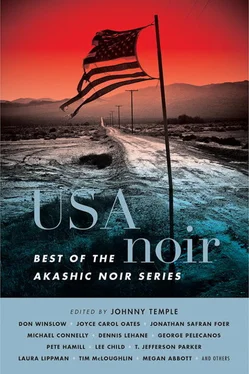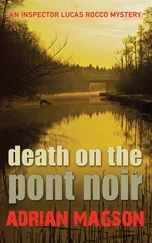Johnny Temple - USA Noir - Best of the Akashic Noir Series
Здесь есть возможность читать онлайн «Johnny Temple - USA Noir - Best of the Akashic Noir Series» весь текст электронной книги совершенно бесплатно (целиком полную версию без сокращений). В некоторых случаях можно слушать аудио, скачать через торрент в формате fb2 и присутствует краткое содержание. Город: New York, Год выпуска: 2013, ISBN: 2013, Издательство: Akashic Books, Жанр: Триллер, Детектив, на английском языке. Описание произведения, (предисловие) а так же отзывы посетителей доступны на портале библиотеки ЛибКат.
- Название:USA Noir: Best of the Akashic Noir Series
- Автор:
- Издательство:Akashic Books
- Жанр:
- Год:2013
- Город:New York
- ISBN:978-1-61775-189-9
- Рейтинг книги:3 / 5. Голосов: 1
-
Избранное:Добавить в избранное
- Отзывы:
-
Ваша оценка:
- 60
- 1
- 2
- 3
- 4
- 5
USA Noir: Best of the Akashic Noir Series: краткое содержание, описание и аннотация
Предлагаем к чтению аннотацию, описание, краткое содержание или предисловие (зависит от того, что написал сам автор книги «USA Noir: Best of the Akashic Noir Series»). Если вы не нашли необходимую информацию о книге — напишите в комментариях, мы постараемся отыскать её.
USA Noir: Best of the Akashic Noir Series — читать онлайн бесплатно полную книгу (весь текст) целиком
Ниже представлен текст книги, разбитый по страницам. Система сохранения места последней прочитанной страницы, позволяет с удобством читать онлайн бесплатно книгу «USA Noir: Best of the Akashic Noir Series», без необходимости каждый раз заново искать на чём Вы остановились. Поставьте закладку, и сможете в любой момент перейти на страницу, на которой закончили чтение.
Интервал:
Закладка:
“Come to Paraquarry Lake! You will all love Paraquarry Lake.”
The name itself seemed to him beautiful, seductive—like the Delaware River at the Water Gap where the river was wide, glittering and winking like shaken foil. As a boy he’d hiked the Appalachian Trail in this area of northeastern Pennsylvania and northwestern New Jersey—across the river on the high pedestrian walkway, north to Dunfield Creek and Sunfish Pond and so to Paraquarry Lake which was the most singular of the Kittitanny Ridge lakes, edged with rocks like a crude lacework and densely wooded with ash, elm, birch, and maples that flamed red in autumn.
So he courted them with tales of his boyhood hikes, canoeing on the river and on Paraquarry Lake, camping along the Kittatinny Ridge where once, thousands of years ago, a glacier lay like a massive claw over the land.
He told them of the Lenni Lenape Indians who’d inhabited this part of the country for thousands of years!—far longer than their own kind.
As a boy he’d never found arrowheads at Paraquarry Lake or elsewhere, yet he recalled that others had, and so spoke excitedly to the boy Kevin as if to enlist him in a search; he did not quite suggest they might discover Indian bones that sometimes came to the surface at Paraquarry Lake, amid shattered red shale and ordinary rock and dirt.
In this way and in others he courted the new wife Marlena, who was a decade younger than he; and the new son, Kevin; and the new daughter who’d won his heart the first glimpse he’d had of her—tiny Devra with white-blond hair fine as the silk of milkweed.
Another man’s lost family. Or maybe cast off —as Marlena had said in her bright brave voice determined not to appear hurt, humiliated.
His own family—Reno had hardly cast off. Whatever his ex-wife would claim. If anything, Reno had been the one to be cast off by her.
Yet careful to tell Marlena, early in their relationship: “It was my fault, I think. I was too young. When we got married—just out of college—we were both too young. It’s said that if you ‘cohabit’ before getting married it doesn’t actually make any difference in the long run—whether you stay married, or get divorced—but our problem was that we hadn’t a clue what ‘cohabitation’ meant—means. We were always two separate people and then my career took off…”
Took off wasn’t Reno’s usual habit of speech. Nor was it Reno’s habit to talk so much, and so eagerly. But when he’d met a woman he believed he might come to seriously care for—at last—he’d felt obliged to explain himself to her: there had to be some failure in his personality, some flaw, otherwise why was he alone, unmarried; why had he become a father whose children had grown up largely without him, and without seeming to need him?
At the time of the divorce, Reno had granted his wife too many concessions. In his guilty wish to be generous to her though the breakup had been as much his wife’s decision as his own. He’d signed away much of their jointly owned property, and agreed to severely curtailed visitation rights with the children. He hadn’t yet grasped this simple fact of human relations—the more readily you give, the more readily it will be taken from you as what you owe.
His wife had appealed to him to be allowed to move to Oregon, where she had relatives, with the children; Reno hadn’t wanted to contest her.
Within a few years, she’d relocated again—with a new husband, to Sacramento.
In these circuitous moves, somehow Reno was cast off. One too many corners had been turned, the father had been left behind except for child-support payments.
Trying not to feel like a fool. Trying to remain a gentleman long after he’d come to wonder why.
“Paraquarry Lake! You will all love Paraquarry Lake.”
The new wife was sure, yes, she would love Paraquarry Lake. Laughing at Reno’s boyish enthusiasm, squeezing his arm.
Kevin and Devra were thrilled. Their new father—new Daddy —so much nicer than the old, other Daddy — eagerly spreading out photographs on a tabletop like playing cards.
“Of course,” the new Daddy said, a sudden crease between his eyes, “this cabin in the photos isn’t the one we’ll be staying in. This is the one—” Reno paused, stricken. It felt as if a thorn had lodged in his throat.
This is the one I have lost was not an appropriate statement to make to the new children and to the new wife listening so raptly to him, the new wife’s fingers lightly resting on his arm.
These photographs had been selected. Reno’s former wife and former children—of course, former wasn’t the appropriate word!—were not shown to the new family.
Eleven years invested in the former marriage! It made him sick—just faintly, mildly sick—to think of so much energy and emotion, lost.
Though there’d been strain between Reno and his ex-wife—exacerbated when they were in close quarters together—he’d still insisted upon bringing his family to Paraquarry Lake on weekends through much of the year and staying there—of course—for at least six weeks each summer. When Reno couldn’t get off from work he drove up weekends. For the “camp” at Paraquarry Lake—as he called it—was essential to his happiness.
Not that it was a particularly fancy place: it wasn’t. Several acres of deciduous and pine woods, and hundred-foot frontage on the lake— that was what made the place special.
Eventually, in the breakup, the Paraquarry Lake camp had been sold. Reno’s wife had come to hate the place and had no wish to buy him out—nor would she sell her half to him. In the woman’s bitterness, the camp had been lost to strangers.
Now, it was nine years later. Reno hadn’t seen the place in years. He’d driven along the Delaware River and inland to the lake and past the camp several times but became too emotional staring at it from the road, such bitter nostalgia wasn’t good for him, and wasn’t, he wanted to think, typical of him. So much better to think—to tell people in his new life, It was an amicable split-up and an amicable divorce overall. We’re civilized people—the kids come first!
Was this what people said, in such circumstances? You did expect to hear, The kids come first!
Now, there was a new camp. A new “cabin”—an A-frame, in fact—the sort of thing for which Reno had always felt contempt; but the dwelling was attractive, “modern,” and in reasonably good condition with a redwood deck and sliding glass doors overlooking both the lake and a ravine of tangled wild rose to the rear. The nearest neighbor was uncomfortably close—only a few yards away—but screened by evergreens and a makeshift redwood fence a previous owner had erected.
Makeshift too was the way in which the A-frame had been cantilevered over a drop in the rocky earth, with wooden posts supporting it; if you entered at the rear you stepped directly into the house, but if you entered from the front, that is, facing the lake, you had to climb a steep flight of not-very-sturdy wood steps, gripping a not-very-sturdy railing. The property had been owned by a half-dozen parties since its original owner in the 1950s. Reno wondered at the frequent turnover of owners—this wasn’t typical of the Water Gap area where people returned summer after summer for a lifetime.
The children loved the Paraquarry camp—they hugged their new Daddy happily, to thank him—and the new wife who’d murmured that she wasn’t an “outdoor type” conceded that it was really very nice—“and what a beautiful view.”
Reno wasn’t about to tell Marlena that the view from his previous place had been more expansive, and more beautiful.
Читать дальшеИнтервал:
Закладка:
Похожие книги на «USA Noir: Best of the Akashic Noir Series»
Представляем Вашему вниманию похожие книги на «USA Noir: Best of the Akashic Noir Series» списком для выбора. Мы отобрали схожую по названию и смыслу литературу в надежде предоставить читателям больше вариантов отыскать новые, интересные, ещё непрочитанные произведения.
Обсуждение, отзывы о книге «USA Noir: Best of the Akashic Noir Series» и просто собственные мнения читателей. Оставьте ваши комментарии, напишите, что Вы думаете о произведении, его смысле или главных героях. Укажите что конкретно понравилось, а что нет, и почему Вы так считаете.












